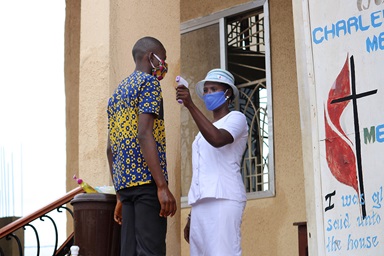“A feeling of despair” hangs over Liberians in the wake of the Ebola crisis and could keep the country from defeating the epidemic, said the Rev. Yatta R. Young, a dean at United Methodist University, Monrovia, Liberia.
Many still suffering from Liberia’s 14-year civil war, which ended in 2003, are adopting a “defeatist attitude,” she told United Methodist News Service.
GET INVOLVED
Read full coverage of church's response to the Ebola outbreak and donate online to United ommunication’s efforts to help the denomination distribute information about the disease at www.umc.org/ebola.
The United Methodist Committee on Relief has to date sent $400,000 in grants to Sierra Leone and Liberia.
“The Ebola epidemic, coming out of the blue at this point in our lives is like a monkey wrench being thrown into our efforts to rebuild our lives,” she said.
Young was recently part of a group distributing buckets, chlorine and soap to families in the New Georgia Estate Community near Monrovia and providing food to an orphanage in the same community. She is former dean of the Gbarnga School of Theology and dean of the proposed graduate studies program at United Methodist University.
Young said families who were not able to get the preventative supplies they needed to keep safe during the epidemic moved her to reach out. Prevention must start at the family level, she said.
She said children are the most vulnerable.
“My heart goes out to these little ones, and I want to make sure that they wash their hands always to keep safe.”
The World Health Organization reported on Sept. 10, the death toll jumped by almost 200 in a single day to at least 2,296. “We know the numbers are under-estimated,” said Sylvie Brand, director of WHO’s department of pandemic and epidemic diseases.
Ebola is spreading “like wildfire” in Liberia said an official with UNICEF, speaking to the BBC.
Liberian President Ellen Johnson Sirleaf, an active United Methodist, said she expects the crisis to worsen as health care workers struggle with inadequate supplies, lack of outside support and a population living in fear.
Old habits hard to break
Young said she is concerned about the cultural socio-economic implications of the preventive measures issued by the health ministry and the Center for Disease Control in an attempt to halt the spread of the disease. Similar thoughts have been expressed by other Liberians.
Many of the precautions are counter to tradition and culture, especially concerning burials, she said.
“The new way has been hard to comply with because to honor to the dead is very important. Children are duty-bound to give their parents a befitting burial as a final sign of respect and a show of gratitude.”
Touching dead bodies is strictly prohibited because secretions are extremely contagious. According to a report on PBS Frontline, precautions for those who have died from Ebola include handling the body in full protective equipment, spraying the body, putting it in a body bag, spraying the body bag, put it in another body bag and then spraying the second bag. All contaminated materials — sheets, clothes, mattresses — are burned.
“I can just imagine Mary Magdalene, Mary, the mother of Jesus and the other women making the trip to tomb on Easter Sunday morning resolutely to give the Lord a befitting traditional burial,” Young said.
Costs soaring
Young said transportation costs have quadrupled because fewer people are allowed in vehicles. Prices for produce and other essentials are soaring because of the increased transportation costs.
“Fellowship time is not the same anymore. We no longer shake hands, hug or kiss Christian brothers and sisters even as we sing ‘Hold somebody; tell them that you love them. Raise your hands together and praise the Lord.’”
People are finding it hard to adhere to simple but effective preventative measures.
“We have our part to play alongside God in this fight to defeat Ebola. So to throw in the towel now states that we feel that our efforts at prevention are useless; and this is not the progressive attitude we need to kick Ebola out of Liberia,” she said.
Julu Swen, United Methodist communicator in Liberia, contributed to this report.
Gilbert is a multimedia news reporter for United Methodist News Service. Contact her at (615) 742-5470 or [email protected].
Like what you're reading? Support the ministry of UM News! Your support ensures the latest denominational news, dynamic stories and informative articles will continue to connect our global community. Make a tax-deductible donation at ResourceUMC.org/GiveUMCom.




